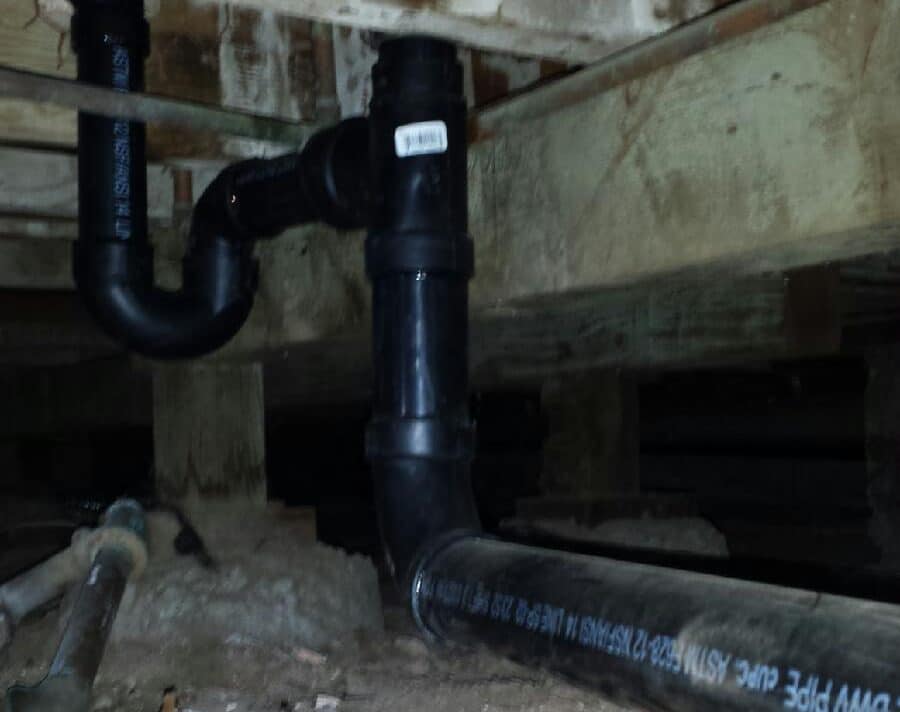
A musty or foul odor in the basement after a rainstorm is an unsettling experience, leaving many homeowners wondering where it’s coming from. In most cases, the answer lies in your sewer line. While rainwater doesn’t directly enter your basement, it can put stress on your sewer system, pushing unpleasant odors through the pipes and into your home. If you’re noticing these smells, it’s crucial to understand the causes and possible solutions.
How Rain Affects Sewer Lines and Basement Odors
Rainstorms can significantly impact your sewer system, especially in areas with older plumbing. When it rains heavily, water can infiltrate sewer systems, causing a range of issues that may lead to odors in the basement:
- Sewer Backups: Excess water from rain can overload the sewer system, pushing sewer gases up through basement drains. Even if there isn’t a full backup, the increased water pressure can still force sewer odors into your basement.
- Poor Drainage: If your home’s drainage system doesn’t efficiently redirect water away from your foundation, moisture can accumulate and cause damp, musty smells. This moisture can exacerbate any existing issues with mold, mildew, or sewer gas, especially in poorly ventilated basements.
- Cracks and Leaks in Sewer Pipes: Over time, pipes may develop cracks due to aging, shifting soil, or nearby tree roots. Rainwater infiltrates these cracks, mixes with waste, and releases foul gases that may seep into your home. Learn more about the impact of rain on sewer systems and foundations in this article on foundation drainage.
Common Sources of Sewer Smell After Rain
Several specific issues can lead to foul basement odors, particularly following a downpour:
- Dry or Damaged Drain Traps: The P-trap or U-trap in your basement drain is meant to hold water to block sewer gases. When dry, it fails to create that barrier, allowing smells to pass through. Heavy rain can dry out or displace the water seal in these traps.
- Backed-Up Floor Drains: Floor drains in basements connect directly to the sewer system. When stormwater increases sewer line pressure, gases and odors may travel back up through these drains.
- Vent Pipe Issues: Vent pipes allow sewer gases to escape outside the home. If a vent pipe is clogged or broken, rainwater can trap gases, pushing them back into the basement. Vent pipes are a critical component of a well-functioning drainage system, as highlighted in this guide to plumbing vent pipes.
DIY Steps to Mitigate Basement Odors
Some initial steps can help reduce or prevent basement odors after rain, though these may only offer temporary relief:
- Pour Water into Drains Regularly: Keeping water in your basement floor drains ensures the P-trap or U-trap remains effective as a barrier against sewer gases.
- Clear Out the Vent Pipes: Obstructions in your vent pipes can contribute to pressure buildup. Regularly checking and clearing these pipes can prevent odors from being pushed indoors during rain.
- Check Your Sump Pump: For homes with a sump pump, make sure it’s functioning correctly, especially before the rainy season. A malfunctioning sump pump can contribute to basement moisture and odors.
- Seal Visible Cracks in Walls or Floors: Small cracks can allow moisture and gases into the basement. Using sealants on minor cracks can help, but remember that this solution may only be temporary.
While these DIY solutions can help, they may not completely solve the problem if there’s a more significant underlying issue. Persistent odors and ongoing sewer problems should be addressed by a professional.
When to Call a Professional Plumber
If the smell continues after trying DIY solutions or worsens, it’s time to seek professional help. Contrary to handymen, Plumbing professionals can diagnose issues that may not be visible to the homeowner and have the tools necessary to fix sewer-related problems safely and effectively. Here are situations where a professional plumber’s help is critical:
- Persistent Odors After Rain: If the smell returns with every rainfall, it’s likely that there’s an underlying issue in the sewer line or vent pipes that only professional intervention can resolve.
- Sewer Line Blockages: If a blockage or backup is causing the smell, plumbers have specialized equipment, like camera inspections, to locate the issue accurately.
- Signs of Sewer Line Damage: When cracks, leaks, or root intrusions are present, plumbers can repair these issues to prevent further damage and odor problems.
How a Professional Plumbing Service Can Help
Professional plumbers use advanced tools to address sewer and drainage problems, helping to protect your home’s air quality and structural integrity. Services that may be needed for foul odors include:
- Camera Inspections: A small camera inserted into your sewer lines can reveal the source of blockages, cracks, or root intrusions.
- Hydro Jetting: This powerful cleaning method uses high-pressure water to clear blockages and is effective for removing buildup in the pipes that may contribute to sewer odors.
- Sewer Line Repair or Replacement: If the sewer line is cracked or damaged, repairing or replacing the affected section will prevent future issues with odors and leaks.
- Vent Pipe Maintenance: Plumbers can inspect vent pipes to ensure they’re functioning correctly, preventing sewer gases from entering the home.
Regular sewer line inspections and preventive maintenance go a long way in avoiding the problems that lead to basement odors. Many homeowners find that professional maintenance not only addresses the immediate odor problem but also helps prevent expensive repairs in the future.
Drain Masters: Expert Sewer Solutions in San Diego
If you’re dealing with persistent basement odors after rain, Drain Masters is here to help. Serving the San Diego area, we offer reliable, professional services to keep your home fresh and safe from sewer-related issues.

